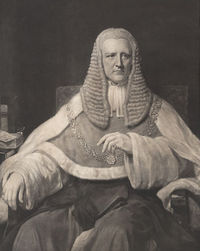- John Coleridge, 1st Baron Coleridge
-
For the Indian Army officer, see John Coleridge (Indian Army officer).
The Right Honourable
The Lord Coleridge
PC
Lord Coleridge. 2nd Lord Chief Justice of England In office
29 November 1880 – 14 June 1894Monarch Victoria Preceded by Sir Alexander Cockburn, Bt Succeeded by The Lord Russell of Killowen Chief Justice of the Common Pleas In office
November 1873 – 20 November 1880Monarch Victoria Preceded by Sir William Bovill Succeeded by Himself
as Lord Chief Justice of EnglandAttorney General for England In office
10 November 1871 – 20 November 1873Monarch Victoria Prime Minister William Ewart Gladstone Preceded by Robert Collier Succeeded by Henry James Solicitor General for England In office
12 December 1868 – 10 November 1871Monarch Victoria Prime Minister William Ewart Gladstone Preceded by Sir Richard Baggallay Succeeded by Sir George Jessel Personal details Born John Duke Coleridge
3 December 1820
Ottery St Mary, Devon
United KingdomDied 14 June 1894 (aged 73)
Westminster, London
United KingdomNationality United Kingdom Political party Liberal Spouse(s) Jane Fortescue Seymour
Amy Augusta Jackson Lawford (1885–1894)Relations John Taylor Coleridge (Father) Children Bernard Coleridge
Stephen Coleridge
1 Other Son
1 DaughterAlma mater Eton College
Balliol College, OxfordOccupation Barrister, Politician John Duke Coleridge, 1st Baron Coleridge PC (3 December 1820 – 14 June 1894) was a British lawyer, judge and Liberal politician. He held the posts, in turn, of Solicitor General for England and Wales, Attorney General for England and Wales, Chief Justice of the Common Pleas and Lord Chief Justice of England.
Contents
Background and education
Coleridge was the eldest son of John Taylor Coleridge, and the great-nephew of the poet Samuel Taylor Coleridge. He was educated at Eton and Balliol College, Oxford, and was called to the bar in 1846.
Legal career
Coleridge established a successful legal practice on the western circuit. From 1853 to 1854 he held the post of secretary to the Royal Commission on the City of London.[1] In 1865 he was elected to the House of Commons for Exeter for the Liberal Party. He made a favourable impression on the leaders of his party and when the Liberals came to office in 1868 under William Ewart Gladstone, Coleridge was appointed Solicitor-General. In 1871 he was promoted to Attorney-General, a post he held until 1873. In 1871 he was also involved in the high-publicity Tichborne Case.
In November 1873 Coleridge succeeded Sir William Bovill as Chief Justice of the Common Pleas, and in January the following year was raised to the peerage as Baron Coleridge, of Ottery St Mary in the County of Devon. In 1880 he was made Lord Chief Justice of England on the death of Sir Alexander Cockburn. Despite his health failing towards the end of his life he remained in this office until his death.
Family
Lord Coleridge married Jane Fortescue Seymour, daughter of the Reverend George Seymour of Freshwater, Isle of Wight, herself an accomplished artist who notably painted John Henry Newman. They had three sons and a daughter. His first wife died in February 1878. He remained a widower until 1885 when married Amy Augusta Jackson Lawford, who survived him. Lord Coleridge died in June 1894, aged 74, and was succeeded by his eldest son Bernard John Seymour, who later became a Judge of the High Court of Justice. His second son Stephen also became a barrister.
Leading cases and judgments
- R v. Coney (1882)
- R v. Dudley and Stephens (1884)
- Gordon-Cumming v. Wilson and Others (1891), the trial arising from the Royal Baccarat Scandal.
References
- ^ "List of commissions and officials: 1850–1859 (nos. 53–94)". Office-Holders in Modern Britain: Volume 9. 1984. http://www.british-history.ac.uk/report.aspx?compid=16911. Retrieved 2008-03-10.
- ^ A short notice of her by Dean Church of St Paul's was published in The Guardian, and was reprinted in her husband's privately printed collection of poems.
 This article incorporates text from a publication now in the public domain: Chisholm, Hugh, ed (1911). Encyclopædia Britannica (11th ed.). Cambridge University Press.
This article incorporates text from a publication now in the public domain: Chisholm, Hugh, ed (1911). Encyclopædia Britannica (11th ed.). Cambridge University Press.
External links
- Hansard 1803–2005: contributions in Parliament by Lord Coleridge
- Archival material relating to John Coleridge, 1st Baron Coleridge listed at the UK National Register of Archives
Parliament of the United Kingdom Preceded by
Richard Sommers Gard
Viscount CourtenayMember of Parliament for Exeter
1865–1873
With: Viscount Courtenay 1865–1868
Edgar Alfred Bowring 1868–1873Succeeded by
Edgar Alfred Bowring
Arthur MillsPolitical offices Preceded by
Sir Richard BaggallaySolicitor General
1868–1871Succeeded by
Sir George JesselPreceded by
Sir Robert CollierAttorney General
1871–1873Succeeded by
Sir Henry JamesLegal offices Preceded by
Sir William BovillChief Justice of the Common Pleas
1873–1880Succeeded by
(office abolished)Preceded by
Sir Alexander CockburnLord Chief Justice of England
1880–1894Succeeded by
Lord Russell of KillowenPeerage of the United Kingdom New creation Baron Coleridge
1874–1894Succeeded by
Bernard John Seymour ColeridgeCategories:- 1820 births
- 1894 deaths
- Barons in the Peerage of the United Kingdom
- Chief Justices of the Common Pleas
- Old Etonians
- Members of the United Kingdom Parliament for English constituencies
- Lords Chief Justice of England and Wales
- Liberal Party (UK) MPs
- Attorneys General for England and Wales
- Solicitors General for England and Wales
- UK MPs 1865–1868
- UK MPs 1868–1874
- Fellows of the Royal Society
Wikimedia Foundation. 2010.
